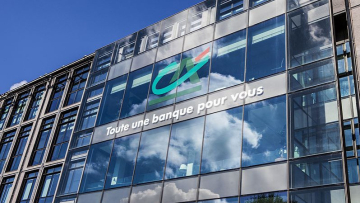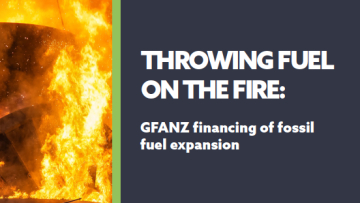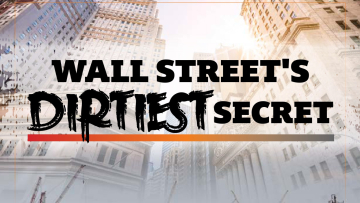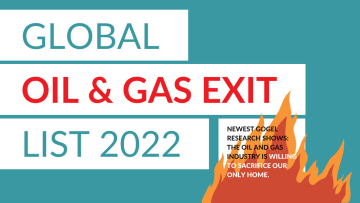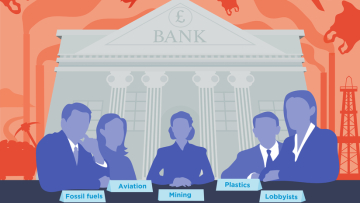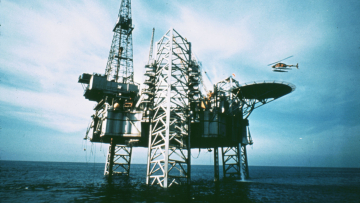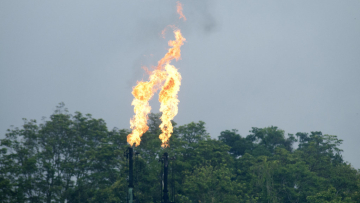
Company – On record
This profile is no longer actively maintained, with the information now possibly out of date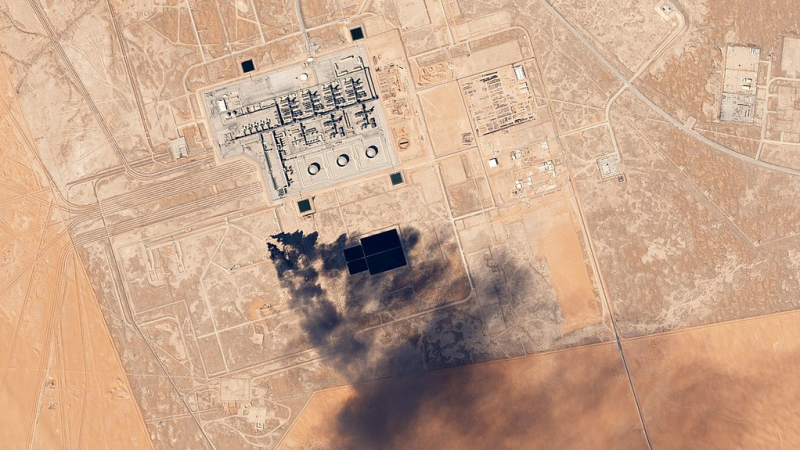
Company – On record
This profile is no longer actively maintained, with the information now possibly out of dateWhy this profile?
A coalition of environmental groups has warned a string of major international banks to step away from facilitating capital for Saudi Aramco, the world’s largest corporate emitter of carbon dioxide. Concerns have also been raised with the banks involved over the horrendous human rights record of the Saudi regime.
What must happen
Banks and other financial institutions must demand that their fossil fuel major clients immediately halt all activities that expand fossil fuel infrastructure, and develop and implement credible phase-out plans for their existing fossil-fuel-based activities, on a timescale aligned with Paris Agreement goals. In the absence of such commitments, banks must stop servicing Saudi Aramco.
| Sectors | Oil and Gas Extraction |
| Headquarters |
|
| Ownership |
listed on Saudi Exchange
Saudi Aramco is majority-owned by the Saudi Arabian State. |
| Subsidiaries |
|
Saudi Aramco, officially the Saudi Arabian Oil Company, is an oil and natural gas company based in Dhahran, Saudi Arabia and was founded in 1933. Saudi Aramco is the largest oil producer in the world. It is one of the largest companies in the world by revenue and, according to Bloomberg, the most profitable company in the world. Saudi Aramco has both the world's second-largest proven crude oil reserves, at more than 270 billion barrels, and the largest daily oil production with more than 13.5 million barrels a day.
Saudi Aramco is the world's largest CO2 emitter, having produced, on its own, almost 5 percent of the world's CO2 emissions between 1992 and 2017. Aramco's operations and the energy they consumed emitted 68 million tonnes of carbon in 2021. In 2035, those emissions, known as its scope 1 and scope 2 emissions, are expected to be 67 million tonnes (FT).
Impact on human rights and communities
Human rights violations in Saudi Arabia Saudi Aramco is fully owned by the Saudi Arabian Government. The country has a dubious, highly questionable record when it comes to human rights. The Saudi Government, which enforces Wahhabi religious laws under the absolute rule of the Saudi royal family, has been accused by various international organisations and governments of violating multiple human rights within the country. The strict regime ruling the Kingdom of Saudi Arabia consistently rankis among the "worst of the worst" in Freedom House's annual survey of political and civil rights.
A 2018 Human Rights Watch report noted that "Saudi authorities stepped up their arbitrary arrests, trials, and convictions of peaceful dissidents and activists in 2018, including a large-scale coordinated crackdown against the women’s rights movement beginning in May. In June, Saudi Arabia ended the long-standing ban on women driving, but authorities continued to discriminate against women and religious minorities. Through 2018, the Saudi-led coalition continued a military campaign against the Houthi rebel group in Yemen that has included scores of unlawful airstrikes that have killed and wounded thousands of civilians."
Capital punishment Saudi Arabia still enforces the death penalty. In 2018 at least 149 people were executed (Amnesty International). On April 23, 2019, Saudi Arabia carried out a mass execution of 37 imprisoned civilians who had been convicted mostly on the basis of confessions obtained under torture or written by the accused's torturers. Most of the executed belonged to the country's Shia minority.
Impact on climate
Climate change impacts Data from world-renowned researchers published in The Guardian has revealed how a group of companies, among them Saudi Aramco, are the heaviest contributors to climate change. Details have shown how they have continued to expand their operations despite being aware of the industry’s devastating impact on the planet. Saudi Aramco is way out in front as the top corporate polluter, having contributed 59.26 billion tonnes of carbon dioxide equivalent since 1965, or 4.38 percent of the world's total emissions since that date.
Opposing climate policies In an October 2019 report, investigative journalistic platform The Intercept noted that "the Saudi Arabian Government have a stunning history of undermining action to address the climate crisis and have a concerted effort designed to preserve the profits of Aramco. Saudi Arabia has played a quiet yet powerful role in thwarting proactive climate policy at United Nations conferences and U.S. domestic policy battles alike. Since the Intergovernmental Panel on Climate Change meeting in Madrid in 1995 — when Mohammad Al-Sabban, then a Saudi petroleum official, famously confronted scientists, claiming the science around climate change was not settled — Saudi delegates have maneuvered to push for a series of delays."
In 2022 12 commercials banks financed Saudi Aramco via lending and underwriting totalling USD 6.33 billion. See below for more details.
In 2022 Citi, Morgan Stanley and HSBC financed Saudi Aramco's subsidiary Base Oil, totalling USD 988.35 miilion. See below for more details.
In May 2020, Saudi Aramco was financed by a USD 10 billion one-year term loan. The loan was led by HSBC, SMBC and First Abu Dhabi Bank. They were joined by BNP Paribas, Citi, Crédit Agricole, JP Morgan, Mizuho, MUFG and Société Générale as mandated lead arrangers and bookrunners. See below for more details.
For Saudi Aramco's IPO in November 2019 the Joint Financial advisers and Global coordinators were: Citi, Credit Suisse, Goldman Sachs, HSBC, JPMorgan Chase, Merrill Lynch, Morgan Stanley, National Commercial Bank and Samba Capital. The joint bookrunners included: Banco Santander, BNP Paribas, BOCI Asia, Crédit Agricole, Deutsche Bank, First Abu Dhabi Bank, Mizuho, RBC, SMBC, Société Générale and UBS.
In April 2019 six banks - JPMorgan Chase, Citi, Goldman Sachs, HSBC, Morgan Stanley and National Commercial Bank - underwrote Saudi Aramco bonds issuances totalling USD 12 billion via five bonds:
- a 3 years USD 1 billion bond, maturing April 2022;
- a 5 years USD 2 billion bond, maturing April 2024;
- a 10 years USD 3 billion bond, maturing April 2029;
- a 20 years USD 3 billion bond, maturing April 2039;
- a 30 years USD 3 billion bond, maturing April 2049.
See below for more details.
2020
2020-05-12 00:00:00 | Saudi Aramco closes US$ 10 billion loan
Saudi Aramco, the world’s largest oil producer, has closed a US$ 10 billion one-year term loan with a group of core relationship banks. The loan was led by HSBC, SMBC and First Abu Dhabi Bank as coordinators, bookrunners and mandated lead arrangers. First Abu Dhabi Bank also acted as facility agent. They were joined by BNP Paribas, Citi, Crédit Agricole, JP Morgan, Mizuho, MUFG and Société Générale as mandated lead arrangers and bookrunners.
2020-04-22 00:00:00 | Saudi Aramco picks HSBC, Japan's SMBC for $10 billion loan: sources
Saudi Aramco has chosen HSBC and Japan’s Sumitomo Mitsui Banking Corporation (SMBC) to coordinate talks with other banks for a loan of about $10 billion the oil giant plans to seek, two sources close to the matter said. HSBC declined to comment and SMBC could not be immediately reached for comment.
2019
2019-11-03 00:00:00 | Saudi Aramco announces Initial Public Offering (IPO)
Saudi Aramco, the world’s largest integrated oil and gas company, wholly owned by the Government of the Kingdom of Saudi Arabia, announced its intention to proceed with an initial public offering on the Main Market of Tadawul, the Saudi Stock Exchange (Saudi Aramco press release).



